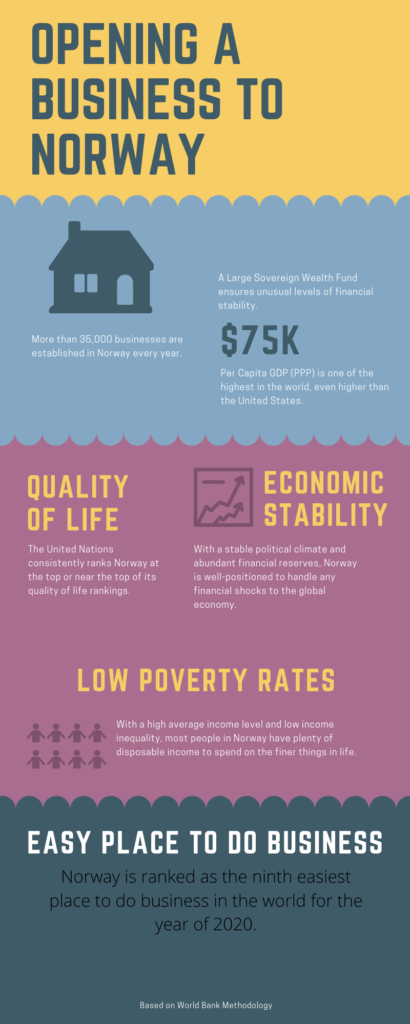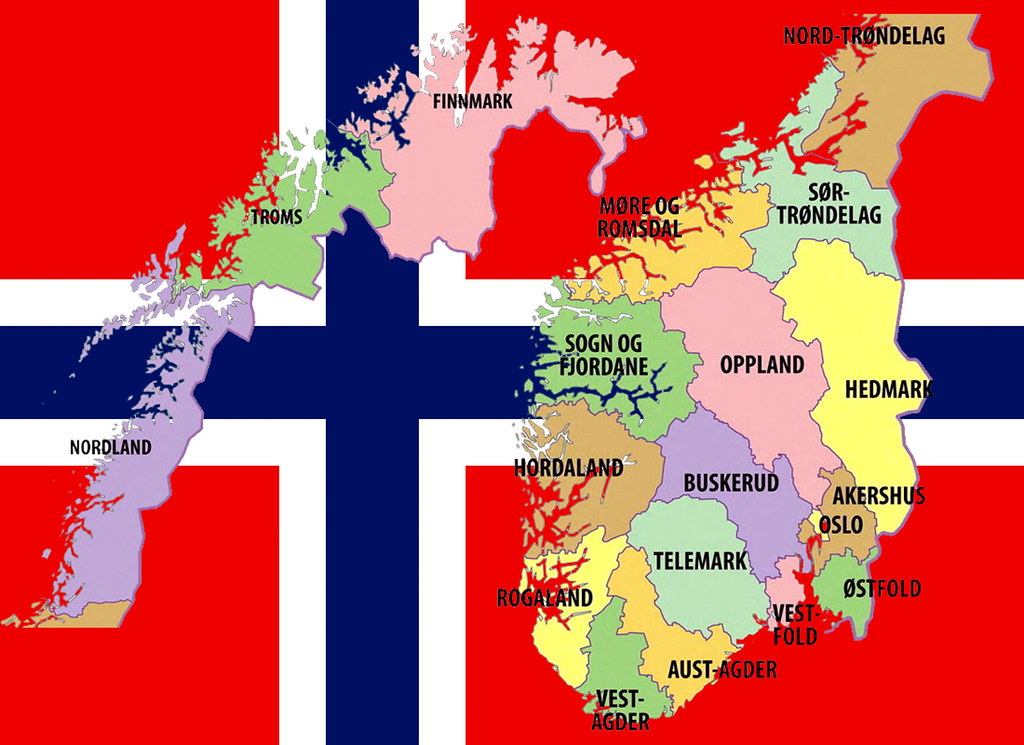One of the Most Attractive Countries in the World

Have you considered starting a business in Norway?
The 21st century has been dubbed by many economists as the century of globalization.
With economic growth taking place in an increasing number of countries, business opportunities can now be found almost anywhere.
What matters to businesses is ultimately finding a market for their products, as well as a good place to make or order them.
Starting a business in Norway has been dubbed by many to be one of the most exciting opportunities of the 2020`s.
Innholdsfortegnelse
Finding the Right Market Requires Thorough Analysis
With goods production or purchasing, the push will be to find the cheapest market to buy or produce from without compromising the quality of the product. When it comes to finding a good market, businesses look for one that has both the means and desire to purchase their products.
It is not enough that a market is affluent enough to point to a successful business venture. Ask chain coffee houses how well they are doing in Southern Europe. The market also needs to have a critical level of enthusiasm for the product in order for it to make sense marketing to them. Such a market, if ever found, is very dear and should be cherished.
As it turns out, there are a handful of markets that broadly fit these criteria for most product categories, and Norway is one of them. We will take you through all you need to know before starting a business in Norway.

Norwegian Economic Situation
The Norwegian economy is one of the most prosperous in the world. Blessed with a hardworking citizenry, as well as abundant natural resources, the Norwegian economy has many legs to stand on.
In fact, Norway is almost alone in being a highly-developed economy whilst being a large exporter of natural resources and energy but also not relying on that as their primary source of national income.
What this has enabled Norway as a country to do is to avoid having its standard of living beholden to global commodity prices like the Gulf States are but also to take advantage of any windfalls during the upswings of commodity super cycles such as during the early and mid 2000s.
Moreover, Norway has stored these surpluses into a massive Sovereign Wealth Fund, or SWF for short. Having a SWF as large as large as Norway’s provides a very comfortable cushion against any potential economic shocks to the global system because that money can be used to plug any temporary gaps in the national economy if need be.

Always Remember the Oil
When the resource sector is taken out of the equation, Norway has a standard of living on par with that of her Scandinavian neighbors. So, the resource sector is basically just economic icing on Norway’s cake. What this means for businesses looking for consumer markets is that the Norwegian market has a level of stability that is almost unrivaled in the world.
Now, being a developed market, Norway will not grow nearly as fast as a market as, say, China would. What Norway has to offer as a consumer market is a mature consumer base with very deep pockets. This will translate into a higher propensity to spend a higher portion of income on discretionary items.
Being a mature market, this means that Norwegians will have relatively expensive as well as well-refined taste as consumers. Businesses going into the Norwegian market need to be aware of this dynamic in order to provide them with what they want.

Taxation in Norway
When it comes to the tax structure, Norway’s in many ways similar to that of other countries in Northwest Europe, in particular Scandinavia. Corporate taxes are kept relatively moderate, with the main emphasis being on personal income taxes, consumption taxes, and social security contributions to raise the bulk of the government’s revenues.
Where Norway differs from the rest of the region is that it derives a significant portion of revenues from oil and gas royalties, which make up about one-sixth of total revenues coming in. So, when compared to the overall economy, this gives Norway a noticeably lower tax burden compared to her neighbors.
Business Implications
From a business perspective, there are a few implications to gleam from the Norwegian economy. Norwegian consumers are going to be some of the most reliable consumers you will ever encounter, especially when it comes to mid-tier luxury goods. Norway is also going to be a stable place for businesses to base themselves from.
Not only is the tax structure stable and upfront, the political stability of Norway put her in a class of her own. This enables businesses to plan long-term without having to worry about any potential hiccups that are out of their control. All you need to worry about is how to serve your customers better than your competitors.

How to Start a Business in Norway
Internationally, Norway is consistently ranked as a very easy place to start a business. With a politically and economically stable climate, Norway provides world-class legal and physical infrastructure that businesses of any stripe can take advantage of, whilst at the same time make a positive contribution to Norway economy and society.
Moving a Business to Norway
Norway is ripe for any established business who is looking for a market to expand into. Thousands of businesses are created or move into Norway every year to take advantage of Norway’s overall system.
One of the most highly recommended ways for international businesses looking to get their foot in Norway’s door is by setting up what is known as a Norwegian-registered Foreign Enterprise or NUF.
An NUF is specifically beneficial for those who already have established businesses outside the country looking to establish a local Norwegian presence. A Private Limited Liability company structure, or AS, is the most common form of company organization, however it does carry a modest capital requirement of 30,000 NOK.
So, if you are looking to establish a largely online presence in Norway but still wish to be officially registered, NUF would most likely be the way to go due to the lack of capital requirements.
Starting a Business in Norway
The registration process for a new business in Norway is fairly clear cut. It is to be done with the Register of Business Enterprises. You will be required to file for VAT registration either at the time of business registration or when your turnover exceeds 50,000 NOK. As always, registering online incurs a lower fee than by post.
Another important thing to remember is that if you do have employees in Norway, you will be legally obligated to enroll them in a mandatory pension plan as well as obtain workers’ injury insurance for every one of them.

Doing Business in Norway
When doing business in Norway, it behooves you to know a few general features about the Norwegian business landscape. It would be best for you to be the jack of all trades when it comes to basic knowledge of the Norwegian economy and focus on being a master of the field relevant to your business.
Key Sectors
Norway’s economy, for the most part, roughly resembles that of other advanced economies in the North Atlantic region. The service sector make up the lion’s share of economic activity, followed by industry with agriculture contributing in the low single-digits.
Again, the key difference is Norway’s outsized resource sector. Petroleum and natural gas make up slightly over half of Norway’s exports. Fortunately, Norway has other key sectors such as machinery and equipment production both for the domestic and international market.
Generally speaking, most newly created businesses will be focused on the service sector, with a significant minority going into high value-added industrial sub-sectors.
Economic Inputs
Norway has one of the best educated and highly skilled labor forces in the world. Norway is also known worldwide for having one of the highest wage scales in the world, even after you adjust for the higher cost of living there.
Another factor contributing to the elevated wage scale is the fact that the labor force is no longer growing significantly and is being outpaced by demand.
What this means for businesses is that of you are looking to take on human employees, you will mostly likely have to channel them into high-skilled lines of work in order to make up for the higher wages. Low value work will either have to be outsourced to labor-intensive economies or given to machines and artificial intelligence.

Starting a Business in Norway: Norwegian Marketing
But regardless how impeccable a country’s infrastructure might be or how conducive its environment is towards foreign investment and business, it is still difficult for anyone to establish a presence in a different country.
Moreover, while they are very valuable, the high wages the average full-time Norwegian employee is accustomed to nonetheless makes this a large potential upfront cost that businesses will need to consider.
Moreover, it is also important to consider the issue of language barriers. Language barriers are a nearly inescapable part of international business simply because of the nature of it.
This is further accentuated by the strong insistence of much of Norwegian society that Norwegian be spoken in everyday life without much exception despite the very high levels of English proficiency.
This is in contrast to many in the region such as Sweden, Denmark and the Netherlands where English is widely used in everyday situations even amongst locals.

Norwegian Content Writer
Fortunately, the information age has given business countless options for any situation they find themselves in. In the case of finding help in breaking the Norwegian language market without breaking the bank is to acquire the services of a content writer who is natively fluent in the Norwegian language.
Hiring a Norwegian content writer allows businesses to have their cake and eat it too. For one, content writers are hired on a pay-per-content basis which excuses businesses from the obligations of a regular full-time worker.
Secondly, a content writer who is a native Norwegian speaker or basically has the fluency and understanding of a native speaker will be able to fashion content that instinctively takes into account the nuances of the Norwegian language, as well as the social norms and morays, in a way even a fluent second language Norwegian speaker simply cannot have.

English to Norwegian Translation
Another option would be to have a native Norwegian speaker translate English language content from your internationally-oriented operations into Norwegian. Again, this would not be a simple translation as it would need to tailor the content to suit the sensibilities of the Norwegian consumer.
One thing that needs to be kept in mind is that even amongst the different cultures that originate from the North Sea area, there still exist significant differences not just in the social norms and priorities of the respective societies, but also in how that is shown in how the different languages are constituted.
For example, the British Isles has a relatively “low context culture” when compared to that of Norway. This means that native English language content is going to be relatively more direct as well as individualistic.
Because of this, a simple direct translation of native English content into Norwegian will most likely not have the same effect in redirecting consumer traffic towards your business.
What a Norwegian content writer would be able to do is to not just translate the words into Norwegian, but also to reorient them in such a way that it would be as if it were originally written with the Norwegian market in mind.

Local Content Means More Sales When Starting a Business in Norway
The last important tenant of international business to keep in mind is that localization can go a very long way. Businesses who make the extra effort to add an additional touch of locality in their product line are quite often caught off guard when they see how well their products are received by the local market.
Never underestimate the power of meeting someone where they currently are. Even when it comes to the consumer market which is supposedly faceless and soulless, any effort at localization conveys a heightened level of empathy towards the consumer.
They will instinctively and subconsciously pick up on it and respond to what you have to offer far better than even your wildest ambitions would allow you to imagine. You will definitely not regret doing so.